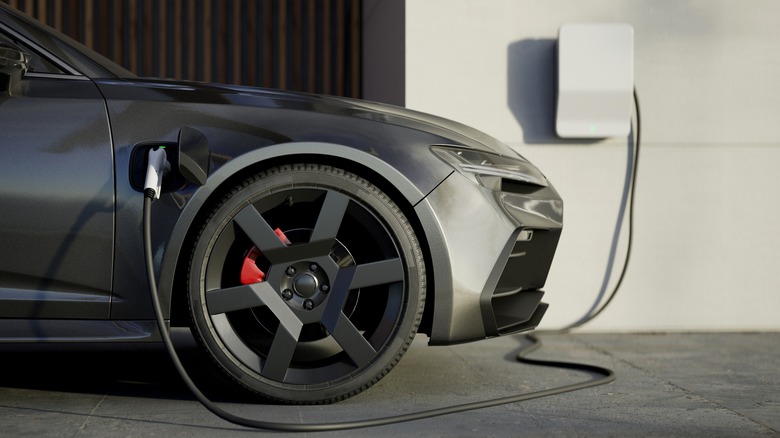The Best Time Of Day To Charge Your Electric Vehicle
The market for electric vehicles is steadily expanding, which means more and more people are buying a non-gasoline powered car for the first time. However, new EV owners may not always be aware of the nuances of owning one (as opposed to a car that runs on gas), and that can lead to a number of potential problems down the line.
One such looming issue is the general cost of charging the EV, because it's an entire car that requires a lot of energy to move, and that energy has to come from somewhere. So of course "filling up" your EV will eat into your home's electric bill. The thing is, just how much home charging will eat into your finances depends on the way your billing is set up.
Many common electric bills are calculated based on a flat rate, meaning you pay for how much power you use, and that cost is static (unless energy prices as a whole begin to rise). There's another option that's being made available in more areas, though: Time-of-use (TOU) billing. TOU billing ascribes fluctuating costs to electricity usage based on the time of day, with peak times being more expensive and off-peak being less so. It's a lot like having to pay more for a train ticket during those busier times of the day, but with energy.
When should you charge your EV?
If you're not using TOU billing (double-check if you're not sure), when you charge your EV is of little consequence. If you do use TOU billing, however, it would be in you and your bank account's best interest to figure out a charging schedule in order to save the major power consumption for off-peak hours whenever possible.
As for what days and times are considered off-peak, it really depends on your state and power company. For example, ConEdison lists peak hours as Monday through Friday from 8 a.m. to midnight (12 a.m.). So if you want to charge during off-peak hours you should aim for just after midnight (12 a.m.) through just before 8 a.m. on the weekdays, or wait until the weekend. Even the time of year can make a difference as ConEd also shows much lower peak rates from November 1 through May 31, so while charging during peak hours will still cost more than off-peak, the gap between the two rates is much smaller than it would be from June 1 through September 30.
It may not be possible to only charge your EV during off-peak hours, but any opportunities you have to do so will still save you money in the long run. Even if you have to split the difference sometimes. Just be sure to check your energy supplier's website for TOU schedules, then do your best to plan around it whenever possible.

